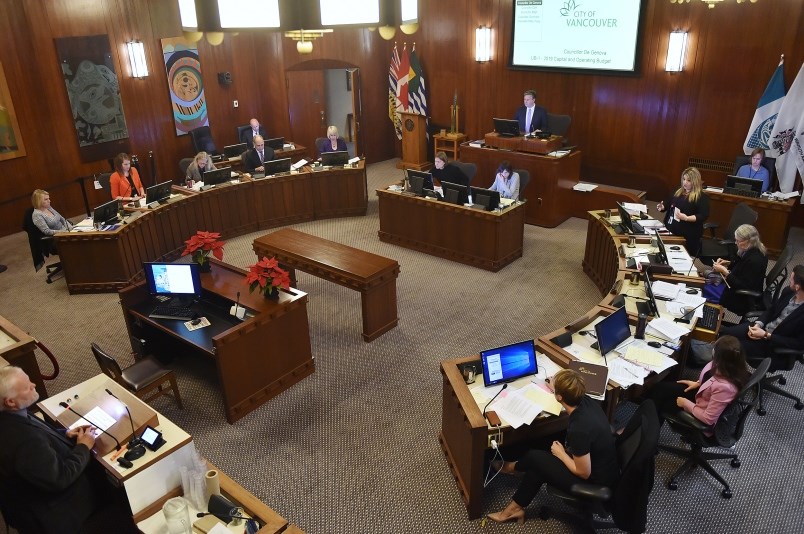Couple of heavy questions for you…
The first one: Should city council formally apologize to the South Asian community for the legislated discrimination enacted decades ago by previous city councils?
The second one: Should city council adopt the definition of anti-Semitism as defined by the International Holocaust Remembrance Alliance and share it with police, the library, park board and school board?
The definition: Anti-Semitism is a certain perception of Jews, which may be expressed as hatred toward Jews. Rhetorical and physical manifestations of anti-Semitism are directed toward Jewish or non-Jewish individuals and/or their property, toward Jewish community institutions and religious facilities.
I’d be interested to hear your answers on both questions because city council will not give an official answer on either question for quite some time.
That’s because the majority of council decided onĚýto refer motions from councillors Christine Boyle () and Sarah Kirby-Yung () to a new committee.
It’s called the Racial and Ethno-Cultural Equity advisory committee. Council recently appointed 15 people to the committee. Members are from a visible or cultural minority group.
I reached out to co-chairs Jessica Ga-Wun Leung and Anabel Lopez, but they declined an interview, saying in an email the committee has yet to “start the process of addressing the motions.”
They did not say they had their work cut out for them because they didn’t have to. That was made clear in the council debate and in an interview with Baldwin Wong, a city staff liaison to the committee.
“It is huge,” Wong said of handling the politically sensitive issues. “But we have a very robust group of people on the committee, so I’m very hopeful that they will actually come to some really good recommendations at the end.”
It’s unclear what happens to the voices of people who were registered to speak to both motions, although they might have an opportunity to weigh in when council receives recommendations from the committee.
Kirby-Yung’s motion on combatting anti-Semitism didn’t include a timeframe when council should expect a report from the committee. That’s because Kirby-Yung and her four NPA council colleagues wanted to hear from 50-plus speakers last week and adopt the definition.
Her motion came the same week a showed the Jewish community continues to be the most targeted group in the country for hate crimes.
“Depending upon [the committee’s] input, it may or may not go to council,” she said in an email. “If and when a report goes to council, speakers should be able to be heard — as we believe they should have been able to be heard at council at this time.”
Some of the councillors who agreed to defer the motion to the committee, including Jean Swanson and Adriane Carr, cited the “hundreds” of emails received from Jewish people who were
An apology to the South Asian community isn’t expected to be as controversial and could occur by next year, if that is the recommendation from the committee and wish of council.
Boyle’s motion requests staff prepare the proposed scope of work, budget and timeline by the fall to ensure consideration for the 2020 budget process.
It’s unclear how that request will now be handled by the committee, although it could be that the committee and staff work together on recommendations for an apology.
Either way, Boyle wants a summary of laws, regulations and policies as far back as the 1890s that details the level of discrimination legislated by previous city councils.
It’s a fact that South Asians weren’t given the right to vote in municipal elections until 1948. It’s also a fact an amendment to the B.C. Elections Act from decades ago considered South Asians “Asian undesirables.”
Like the Chinese, South Asians couldn’t own property in Â鶹´«Ă˝Ół»and were denied professions in education, law and pharmacy, according to Boyle’s motion.
Apologizing for historical wrongs legislated by previous councils is not new ground for Â鶹´«Ă˝Ół»politicians.
The Gregor Robertson-led council — in power from 2008 to 2018 — made formal apologies to the Chinese (in 2018) and Japanese (in 2013) communities.
The was related to injustices dating back to Vancouver’s first civic government, which made it clear at its first meeting in 1886 that “no Chinaman or Indian shall be entitled to vote in any municipal election for the election of mayor or alderman.”
In 1942, the council of the day unanimously passed a motion calling for “the removal of the enemy alien population from the Pacific coast to central parts of Canada,” specifically anyone of Japanese descent without any consideration for place or birth or citizenship.
The city apologized for its complicity, its inaction and for failing to protect residents of Japanese descent. Council also pledged to do all it can to ensure such injustices will not happen again.
Now it’s over to the new council to make its own pledges related to the South Asian and Jewish communities. Which means the committee’s work on these two files can’t happen soon enough.
@Howellings
Ěý



